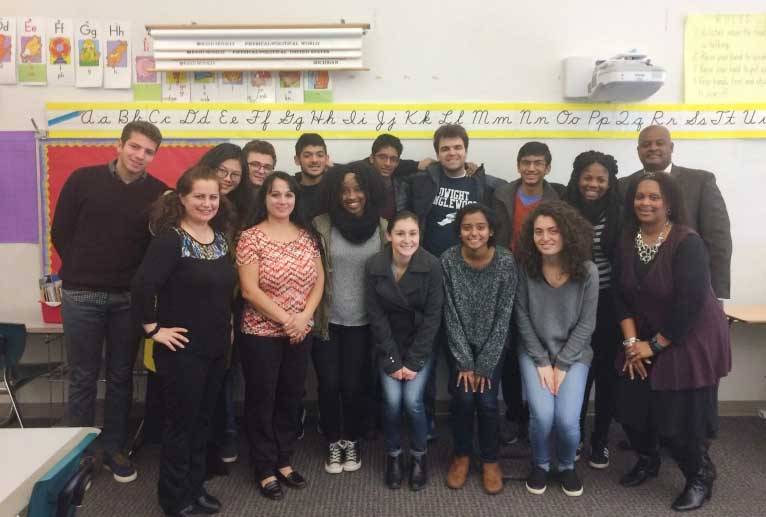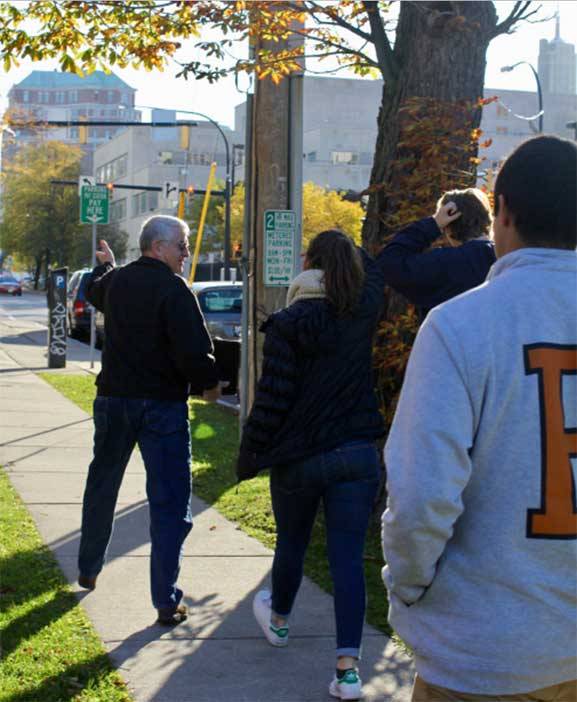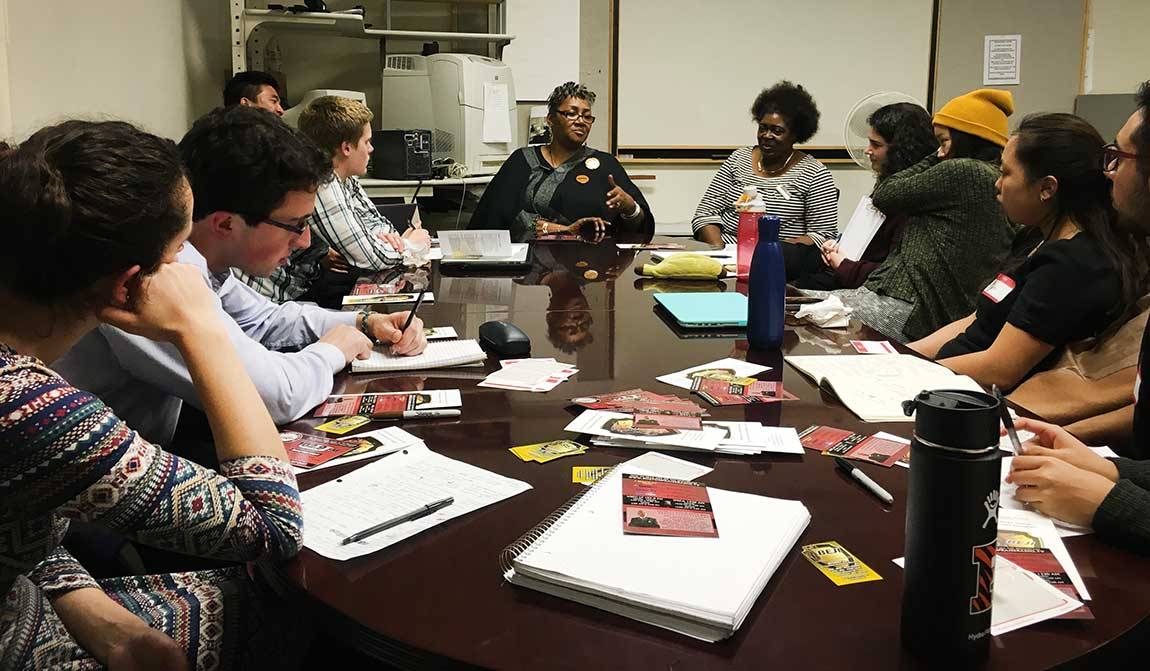Ninety days. Ninety days for refugees to receive financial support from the federal government to begin their new lives. Ninety days to find a job, learn the language and adjust to American life.
"That is how long the government has defined as the 'resettlement period' for refugees coming to the U.S.," said Michelle Yeh, a sophomore examining the refugee resettlement process as part of a trip to Buffalo, New York, with the Pace Center for Civic Engagement's Breakout Princeton program.
"As an international student from Taiwan, I found the brevity of this time period so incomprehensibly shocking," she reflected in an online blog. "Coming to the U.S. more than a year ago, I found it hard just to adjust to life in Princeton. Still to this day there are certain aspects of living in the U.S. that I do not understand. … People spend 90 days on holiday, 90 days completing a novel, 90 days learning the material for a final. To get a footing in a new environment and culture in just 90 days is a lot to ask for and goes to show that a refugee's story doesn't end once they step foot in the U.S."

As part of their effort to better understand the many facets of refugee resettlement, Princeton students in the Breakout Princeton trip "Resettling Refugees: Deconstructing a Complicated Narrative" visited Greenfield Union Elementary-Middle School in Detroit. The team met with Principal Curtis Dunlap, Vice President Murleen Cookley and other school leaders to learn about the school's ability to accept refugee students. (Photo by Marlyn Bruno, Class of 2017)
Each fall and spring break Princeton University students travel across the country to learn about critical social issues and engage in thoughtful dialogue and action as part of Breakout Princeton. Yeh was one of 65 students to leave campus Oct. 29-Nov. 4 to examine social issues with the program. In all, five trips designed and led by Princeton students explored a wide range of topics, from refugee resettlement and immigrant health care, to the racial impacts of economic recession and navigating the health care system as transgender.
Breakout Princeton welcomes the campus community to join trip leaders and participants for a special post-trip gathering from 5:30 to 7:30 p.m. Wednesday, Nov. 16, in McCosh Hall, Room 10. The teams will share what they've learned, meaningful experiences from their trips and more.
When creating Breakout Princeton trips, students focus on building an experience that offers a 360-degree view of social issues, connecting with people and organizations on all sides. Students gather for pre-trip learning, often connecting with University faculty members and local organizations to begin their exploration. Meeting face-to-face with professors, organization leaders, volunteers, community members, politicians and others is one of the most important and influential parts of the experience, students say.

The "Refugee Resettlement: Understanding an Ongoing Journey" trip team got a first-hand look at how refugees have an impact in Buffalo, New York, through a walking tour led by Chuck Massey, a former Houghton College professor involved with refugee resettlement in the city. Here, the team is on the way to Buffalo's City Hall. (Photo by Tess Bissell, Class of 2017)
"We wanted our trip to focus on talking with families and listening to their stories," said Safa Syed, a senior majoring in history. Syed co-led the "Resettling Refugees: Deconstructing a Complicated Narrative" trip to Detroit with Sarah Sakha, a junior majoring in the Woodrow Wilson School of Public and International Affairs.
"What is great about Breakout is that while you may read all you can about these issues on your computer screen at Princeton, you learn so much more being in a place where maybe you're not the most comfortable; where you are talking to people and hearing about their own struggles," Syed said. "We've read stories and articles, seen documentaries, but now we can actually see and hear from the people themselves."
"It makes what we're learning about that much more real," said Ryan Hileman, a sophomore majoring in comparative literature with a certificate in global health and health policy. He co-led the "Health Away from Home: Challenges in Undocumented Immigrant Health Care" trip in New York City and Philadelphia with Stacey Park, a senior psychology major.
"When else would we have the chance to visit so many different organizations — government organizations, lobbying groups, grassroots organizations, private companies, public companies — and speak with leaders and ask questions," he said. "We learned so much, not only about the health care system and the challenges undocumented immigrants face, but also about the people we met with, their personal stories and how they came to be where they are."

The "Gender and Health: Navigating the Health Care System as Transgender" Breakout Princeton trip team visited Callen-Lorde Community Health Center in New York City, which specializes in LGBT healthcare and health advocacy, to understand more about the challenges transgender people face when navigating the healthcare system. (Photo by Melanie Ho, Class of 2018)
Learning through discussion
Each trip deals with complex issues. To unpack the many layers, intersections and intricacies, discussion is vital. Students not only engage in thoughtful conversations with organizations and community members, they also debrief and reflect together about the day's conversations and activities.
"Our learning goals for the trip were to give students a general idea of what transgender actually means, how the health care system operates and how to be a better ally for transgender people," said Alice Mar-Abe, a senior majoring in politics. She co-led the "Gender and Health: Navigating the Health Care System as Transgender" trip in New York City with Ellie Sell, a senior chemistry major.
"We really wanted to give everyone a way to understand the issues and people better," Mar-Abe added. "What was great about getting together each night to talk, was how our conversations covered stuff we didn't expect to. Several of our participants used it as a jumping-off point to consider where their career paths might go. One student, who is pre-med, began asking whether they should consider a different role and go into policy."
Sakha, co-leader of the refugee trip to Detroit, said her group's conversation after meeting a 17-year-old Syrian refugee and sharing dinner with refugee families at a mosque were particularly meaningful.
"The discussion afterwards was so emotionally charged, provocative and thought-provoking," she said. "To be invited into this space and to meet people who welcomed us was amazing. The empathy and ideas shared really made me realize the immense value of Breakout."
Aly Kersley, a sophomore who co-led the "Refugee Resettlement: Understanding an Ongoing Journey" trip in Buffalo with sophomore and Buffalo native Micah Herskind, said the discussions during the trip now have a more urgent meaning following the U.S. presidential election.
"Being on this trip really made me understand how important this election is in a different way," Kersley said. "It opened my eyes and made me more aware and connected to this issue. Before going I think I understood on a much more intellectual level, but now I feel connected to it on a more emotional level. Everyone we met told us to vote and now it's clear why that was so important." She said she is concerned that "refugees may no longer be allowed into this country. Refugees here may face more discrimination, even more challenges then they already do."

Students on the Breakout Princeton trip "The Great (Racial) Recession: Causes, Consequences ... Closure?" traveled to Boston and met with the Black Economic Justice Institute to understand more about the organization's efforts to empower, educate and mobilize the city's African American community. The team met with founder Priscilla Flint-Banks and coordinator Sheila Blalock. (Photo by Austin Addison, Class of 2018)
Bringing it back to campus
For the teams, the end of the trip doesn't mean the end of their exploration. Students often find ways to incorporate or extend what they learn back on campus.
"We are not the end-all and be-all," said Syed. "There is so much still to learn and so much still to do. I hope everyone on our trip takes away something that will inspire them to talk to people, engage with others, and take personal initiative to be more knowledgeable about refugees, resettlement and other issues."
The students on the refugee trips plan to get together to discuss what they learned from Buffalo and Detroit, and to see how they can connect other refugee projects and initiatives on campus. The Detroit team hopes to set up an ongoing project with one of their partner organizations to help refugees who are high school students navigate the college application process.
"Applying to college in Syria and Iraq is very different than in the U.S.," said Syed. "We're working to possibly set up a college application workshop and a way to help the high school students with their college applications or essays."
For "The Great (Racial) Recession: Causes, Consequences … Closure?" trip to Boston, learning about the complexities of financial systems, the housing market and tools like mortgages opened the team's eyes to how much they didn't know about even some of the most basic concepts.
"We're looking at how even college students at Princeton need help with financial literacy," said Austin Addison, a junior majoring in politics with an interest in international relations. "And perhaps there are tools and resources we can provide to help students understand how to reduce their debt, read a credit report and track their finances."
Students from the Gender and Health trip have begun working with the Lesbian, Gay, Bisexual and Transgender (LGBT) Center and pre-medical advising staff at the University to bolster knowledge and training.
"We will be working with Health Professions Advising office to host a training session for pre-medical students on language and appropriate ways to interact with transgender people as a health care provider," said Sell, co-leader of the Gender and Health trip. "We hope that this training will increase future physicians' sensitivity and respect for transgender patients they might have the privilege of treating in medical school and throughout their career."
Applications to go on Breakout Princeton trips during spring break 2017 are open and are due Dec. 2. Learn more at a Breakout Princeton Open House on Tuesday, Nov. 21, from 5 to 7 p.m. in the Pace Center Lounge, Frist Campus Center, Room 201A, or visit pace.princeton.edu.




